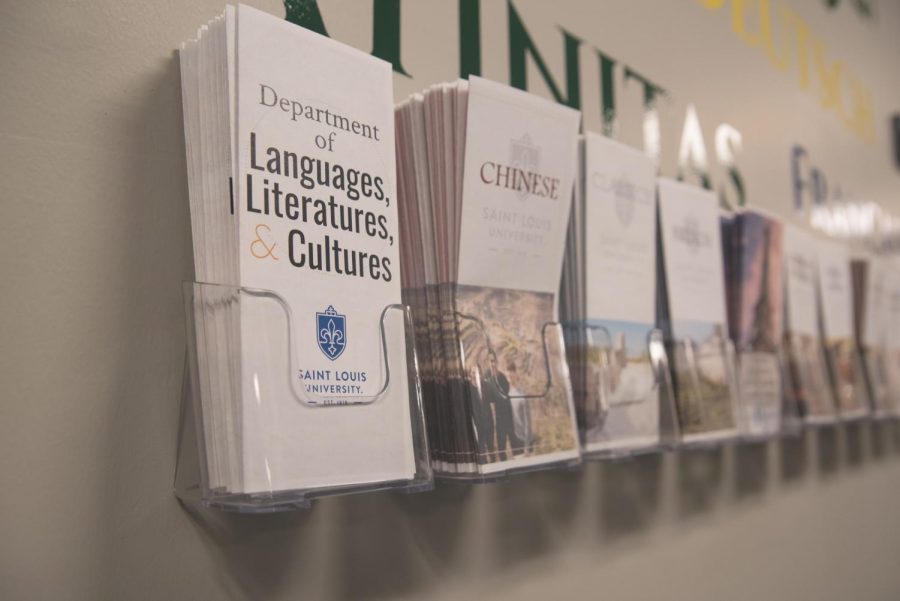Future of Chinese Program In Doubt
Last week, students and faculty members associated with SLU’s Chinese Program learned that after the 2019-2020 academic year, SLU’s Department of Languages, Literatures and Cultures will no longer offer Chinese language courses for an indefinite period.
The program’s future is in jeopardy after financial difficulties influenced the decision not to renew the only full-time Chinese faculty member, Dr. Lili Guo, who is the primary Chinese language instructor. As a consequence, the Chinese program will effectively cease to function after the current academic year.
Dr. Michael Lewis, Interim Dean of Arts and Sciences, who was interviewed on the future of the Chinese program, said “At this point, the future of the program remains in question. It is not officially being cut from the books.”
Lewis explained that since the only full-time faculty member will not be renewed, incoming and current students will not be able to take courses in Chinese beginning in the fall of 2020. This nuance might give some hope to students, since a complete cut of the program would be significantly more difficult to reverse.
Still, Lewis said, “I know this is no solace, especially for those students who would like to declare the minor but cannot.” As it stands, Lewis is continuing to work with trustees and other concerned parties to determine if the program has a future.
To students and faculty involved with the Chinese program, especially the seventy current minors, the decision represents a tacit cancellation of the program, the ambiguity notwithstanding. Soon after the announcement, senior Malaya Siy, currently nearing completion of the Chinese minor, created a Change.org petition, called “saveSLUchinese,” in which she voiced the displeasure felt on behalf of the faculty and the student body. Since the petition was launched, it has gathered more than a thousand signatures, with the number growing daily.
Such a positive response to the petition indicates a widespread belief that no longer offering Chinese is antithetical to SLU’s values as a Jesuit institute of higher learning. SLU’s mission to foster “programs that link University resources to local, national and international communities” is a fundamental aspect of our identity, and the Chinese program is a direct manifestation of this commitment.
Since its inception in 2003, SLU’s Chinese program has blossomed into a vibrant and engaging curriculum with the dual purpose of preparing graduates for employability in today’s globalized job market and enriching cultural interactions on SLU’s campus.
Siy stressed the numerous advantages that will be lost if the program is cut. “The practical side is significant. Chinese is the second most spoken language in the entire world, which yields enormous practical value for students entering the job market.”
But, Siy added, the practical angle is only the start. Through classes that satisfy the minor requirements, SLU students have the opportunity to participate in a unique cultural dialogue. As SLU’s last remaining Asian language, the program is a vital linguistic component to bridging the diverse backgrounds that characterize SLU’s campus.
With 8 percent of SLU students arriving from outside of the U.S., and an Asian population of almost ten percent, the Chinese program affords the Asian community important linguistic representation.
Students enrolled in Chinese classes are taught not only the basics of reading, writing and conversation, but are also exposed to Chinese history, literature and culture. And for students, it is this cultural component that has been the most fruitful part of the Chinese program.
A striking example of the cultural engagement that makes the Chinese program so essential is Guo’s Cultural Comparisons class, which takes an interdisciplinary approach to comparing social relationships, education, food and other prominent cultural features in the United States and China.
Siy, who is currently enrolled in the class, said that it has been a wonderful opportunity to bridge cultural gaps between American and Asian students. “The relationship is reciprocal. Both sides add unique insights, and everyone leaves knowing more about the other’s culture.”
Siy went on to add that SLU’s vibrant Asian community is especially stimulating for the Chinese program. “There are some things that just can’t be taught in a normal classroom setting. The cultural comparisons class and other opportunities through the Chinese program bring the two communities together. For example, we can teach each other slang. It’s interactions like these that make the program so enjoyable.”
Beyond losing out on concrete benefits that the program yields, Guo is most concerned that losing the Chinese program will have grave implications reaching far beyond the program itself. Elimination of the program, Guo argued “not only affects the Chinese language program, but other important affiliated programs, and the effect will be far reaching.”
Guo pointed to the Asian Studies program and SLU’s 1818 program as those which will be most adversely affected by the elimination of the Chinese program. The Asian Studies program is a key component of SLU’s area studies programs, which equip students with necessary regional knowledge in preparation for a diverse array of careers, including foreign service and international business.
Moreover, SLU’s 1818 Advanced College Credit program will be negatively affected if Chinese is no longer offered. Over 100 schools across the country have partnered with SLU to give their students an opportunity to earn SLU credit for their work in high school.
In years prior, high school students have taken advantage of this opportunity to get a headstart in the Chinese minor. By eliminating study of the language at SLU, Guo fears that students with a passion for Chinese who have participated in the 1818 program will pass over SLU as a potential college option.
Indeed, this fear is not limited solely to 1818 participants. In the St. Louis area alone, Webster University, UMSL, Washington University and Lindenwood University all offer courses in Chinese. While SLU students do have the opportunity to take Chinese classes through these universities, incoming students serious about Chinese might decide the extra hassle is simply not worth it.
SLU’s Jesuit heritage is also a factor when thinking about incentives for incoming students. Out of the twenty-seven Jesuit institutions of higher learning across the country, SLU will become one of only three that do not offer courses in Chinese. With no lack of opportunity to study Chinese at other Jesuit institutions, SLU might lose more than a few potential students.
As the current academic year unfolds, current and potential Chinese minors will have a better idea about the future of Chinese at SLU. Until that point, students and faculty remain committed to raising awareness about the indispensable role that the Chinese program plays in putting core SLU values into action.
Your donation will support the student journalists of Saint Louis University.






Paul Zhao • Sep 21, 2019 at 12:08 am
Impressively written article with solid reporting on a critical topic. What will become of a university that is willing to “save ”on the salary of a single professor at the expense of numerous students’ educational benefit and at the sacrifice of an institution’s core values and principles. The future bodes poorly for SLU if this is the cost-benefit strategy espoused by administrative leadership.